Armando Iannucci’s The Death of Stalin spurs a question that applies to many countries through history, but might echo most pertinently with baffled observers of Trumpland: how much of what is happening in a government is venal, craven self-interest, and how much sheer incompetent bumbling?
He confirms your worst fears about what politicians say and do behind the scenes
The political satire is not directed at the US president or any specific leader, though. It extends the world view that Iannucci has applied to British and American political manoeuvres in In the Loop, a black comedy about stumbling toward war, and the series Veep, one of the most poisonously truthful satires ever made. He confirms your worst fears about what politicians say and do behind the scenes, and cloaks the bad news in hilarious, sharp comedy.
- Lady Gaga’s ‘endless navel-gazing’
- Has Hollywood let Idris Elba down?
- Can Angelina Jolie make a great film?
The Death of Stalin, set in the Soviet Union in 1953, is endlessly funny, but more absurdist than those earlier works. The story spins off from real events. When Josef Stalin suffers a stroke and collapses, guards are so fearful of entering his room that he is left on the floor in a puddle of urine for hours. In the aftermath of his death, his closest ministers, who once trembled at his every glance, begin their scramble for power. As they do, Iannucci masterfully blends dark humour about an authoritarian regime and farcical comedy performed with perfect timing.
Life under the dictator is captured at the start when Stalin hears a radio broadcast of a musical concert and calls the station to demand a recording of it. But the concert hasn’t been recorded, which sends the already-nervous producer (Paddy Considine) into a panic.
Pulling people off the street to sit through a second concert, to be recorded only for Stalin, he blithely assures them, “Don’t worry, nobody’s going to get killed.” Under the circumstances, that’s a reassurance they need. To see how Iannucci mixes the terrifying and the ludicrous, just look at one of the confused newcomers: a peasant carrying a live chicken into the concert hall.
Steve Buscemi nearly steals the film as Nikita Khrushchev
When word spreads to the ministers that their leader is ill, they rush to his dacha. Gathered around, they peer down at Stalin, still in his puddle on the floor, all of them fearful of making a wrong move.
Steve Buscemi nearly steals the film as Nikita Khrushchev, so cleverly obsequious that he has his wife keep track of which of his jokes Stalin liked and which fell flat. When he reacts to Stalin’s demise with “This is calamity,” Buscemi’s reading is so beautifully underplayed that just enough of Khrushchev’s insincerity and ambition shine through.
His main rival for power is Beria, head of the security forces, the man who keeps the lists of people to be executed at Stalin’s whim. Simon Russell Beale plays him as an apoplectic villain, the ruthless counterpart to Khrushchev’s reformer.
Power play
Iannucci gets bold performances from everyone, with each actor revealing a different comic streak. Jeffrey Tambor plays the vain Malenkov, next in line to Stalin but actually Beria’s pawn. Michael Palin is the hapless Molotov, so brainwashed by Stalinism he will pretend his wife is a traitor if it saves his own life. Andrea Riseborough plays Stalin’s level-headed and suspicious daughter, Svetlana, who can see trouble coming.
Her spoiled brother, Vasily (Rupert Friend), has more vodka in his system than he has brains and is clueless about how different life will be now that his father is gone. “I want to make a speech at my father’s funeral,” the always unreliable Vasily says, and Buscemi as Khrushchev snaps back that he wants to sleep with Grace Kelly. Obviously, neither of these is going to happen.
The ludicrous touches give the film a warm comic feel rather than the bitter chill of In the Loop
The film is based on a graphic novel, and Iannucci embraces those broad, cartoonish roots. When the advisers carry Stalin’s body into his room and dump it on the bed, the episode is a small, slapstick delight. Those ludicrous touches give the film a warm comic feel, rather than the bitter chill that emanates from In the Loop.
The actors’ accents are a casual mix of British and American – no fake Russian-speakers here – which enhances the ridiculous aura. Authenticity is not in the movie’s texture. Its look is studio-bound, in the manner of films from the period it depicts.
The film does have a few piercing moments. Khrushchev, as the end titles indicate, became the USSR’s sole leader in 1956. The movie’s final glimpse of him reveals the savage wit beneath Iannucci’s absurdist romp.
Shot before Trump became US president, The Death of Stalin is one of many films to arrive in a global landscape different from what their creators might have expected. There is a new resonance when Khrushchev talks about the importance of telling the right story whether it is true or not. “This is how people get killed, when their stories don’t fit,” he says. It is possible to see Beria as a Putin stand in. But the film’s humour accommodates any political opinion. It is one of Iannucci’s most consistent, convincing tropes that at various times everyone in power seems idiotic.
★★★★☆
If you would like to comment on this story or anything else you have seen on BBC Culture, head over to our Facebook page or message us on Twitter.
And if you liked this story, sign up for the weekly bbc.com features newsletter, called “If You Only Read 6 Things This Week”. A handpicked selection of stories from BBC Future, Earth, Culture, Capital and Travel, delivered to your inbox every Friday.
